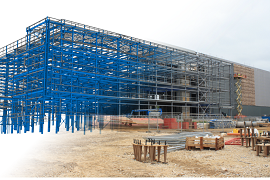Main author
Michael BrooksInterview with Melanie Leech

|

|
The British Property Federation (BPF) is the membership organisation for, and the voice of, the UK real estate industry. It aims to represent and promote to government and regulatory bodies the interests of all those with a stake in real estate in the UK – owners, developers, funders (equity and debt), agents and advisers.
Designing Buildings Wiki sat down with BPF Chief Executive Melanie Leech to discuss some of the wide-ranging issues facing the real estate sector today - from tackling the housing crisis with the 'win-win situation' of Build to Rent, to the impacts of Brexit, and the possibility of a future asset bubble.
| Designing Buildings Wiki (DBW): You moved to the BPF from the Food & Drink Association. What was it about the challenge presented by the real estate sector that drew you to the role? |
Melanie Leech (ML):
Before the Food & Drink Association I was in the civil service for most of my career, so what I’m interested in is public policy and how you shape policy, legislation and decision-making around big challenges.
Both food & drink and real estate are sectors that are absolutely central to the quality of our lives, as well as being important for economic success. Commercial real estate contributes about £95 billion each year, but there’s also the ‘value-add’ of creating infrastructure which enables us to be more productive, as well as creating great places where people work, live and play, and the contribution that can make in terms of social cohesion.
| DBW: What are the BPF’s views on Heathrow expansion and the HS2 developments? |
ML: We are incredibly supportive of investment in infrastructure (although we don’t tend to champion individual projects) and the recent announcements are a very welcome statement of commitment.
Though important, it’s not just the big headline projects; quite often it’s the smaller investments that can unlock particular sites and make a real difference to local communities country-wide.
| DBW: The BPF has been trying to encourage and promote to the Government the idea of Build to Rent as a means of tackling the housing shortage. Could you explain the BPF’s approach to Build to Rent? |
ML: There are a number of key themes that we are trying to promote with Build to Rent. The first is that rental is now the second-largest form of tenure in the UK. To focus on increasing supply to tackle the housing shortage, you have to increase property across all tenures.
Secondly, Build to Rent brings in genuinely new investment to housing. As a concept, it is interesting to long-term investors like pension funds that want a long-term income stream, and like the social contribution of high quality rental.
Finally, you can deliver rental accommodation more quickly than houses to buy, so if you want to tackle the housing shortage - driving early implementation of housing, bringing in new investment and delivering more quickly, seems to us to be a win-win situation for the government.
| DBW: In Sept 2016, RICS reported that 86% of landlords had ‘no plans whatsoever’ to increase their rental portfolio. What do you think the government could be doing to encourage rather than dampen investment in Build to Rent? |
ML: You have to separate out Build to Rent, which is by-and-large about institutions building high quality residences in a managed block of hundreds of units, from traditional landlords who are often involved on a much smaller scale. Because the business model is very different, it’s quite hard to compete; you need things like covenants which make it clear that the land is for rental properties, and that helps to even out the playing field.
I think the 3% stamp duty surcharge is at the top of the list in terms of things that have dampened rather than helped to stimulate investment, so the government should really think about reversing that.
| DBW: In your experience to date, do the government seem receptive to the idea of Build to Rent? |
ML: Yes I think they are. Certainly over the summer and in the Autumn Statement, you’ve seen a focus away from demand-side measures, which were much more about helping people to buy up the supply that’s already there. Instead the government is now focusing increasingly on stimulating the supply-side.
I think we’re getting the message across that rental is an important part of the solution. We’re working very closely with the Housing Minister and the government to work out the best way in which they can stimulate that investment.
| DBW: On the subject of the Autumn Statement, what were your thoughts on the banning of letting agency fees? What might this mean for agents and landlords? |
ML: Most large scale Build to Rent landlords don’t actually charge fees so I don’t think we, on their behalf, will be particularly concerned about that. But it will be interesting to see and work through the details because there will be costs bound up that need to be met somewhere along the line. But in principle, I don’t think we’re too concerned about it.
| DBW: What is the BPF’s attitude towards BIM and its adoption by the private sector? |
ML: We are supportive but it is early days. The government is trying to, and will, play a huge role in trying to drive adoption of BIM through its procurement policies. There are issues and concerns, things to be worked through around contracts, liability, cost, protecting intellectual property, and so on.
I don’t think we have an informed view yet about what the implications are. The early adopters have driven good practice and it works for them, but I think we’re some way from being able to say there is confidence and that those issues have been resolved in a way that will drive through general adoption at this stage. That’s not to say though that it isn’t an objective to aim for.
| DBW: What advice would you give to the government regarding the Brexit negotiations? |
ML: Our concerns are pretty similar to those of our customer base: about access to skills and talent, making sure that we can ensure maintain construction activities, about our customers and their ability to move talent around in a way that they want to do, that means the UK will continue to be a competitive place for global companies.
It’s important to make sure that while we negotiate our exit from the EU we don’t put everything else on hold, there’s lots of stuff we can be doing. So we would say, on the one hand, protect our ability to employ talent, protect the UK’s (and London’s specifically) place in the global marketplace, and keep the foot on the pedal of all the good things that are going on at the moment.
Because these are all critical to our economic success post-Brexit; things like investment in infrastructure, maintaining a stable and competitive tax system, all of these things are more important than ever.
| DBW: Do you have much of a sense from members and the different groups that BPF represents about the scale of the impact on real estate of leaving the EU? |
ML: It’s really very early to say for a number of reasons. For a start, it looks different across a number of sectors. There is a lot more uncertainty in the commercial office market than some others just because of all the issues that are up in the air.
If you look at the logistics sector, even accommodation, healthcare, housing; there is a lot less potential impact because we will still need to house people, still have an ageing population that will need to be cared for, etc. So it’s quite hard to know at this stage whether the impacts that we’re seeing in certain parts of the market are more than just current uncertainty.
| DBW: What are your thoughts on Labour’s proposals to encourage councils to build by lifting the local authority borrowing cap? |
ML: Really interesting actually. The idea of finding more innovative ways of public-private partnership will be key to a lot of the regeneration and investment that will need to go into towns and cities across the country. Anything that can be done, any new thinking around trying to make that easier for the public, as well as the private, sector is important and encouraging.
| DBW: Are you concerned about the rate of foreign investment into real estate, particularly in London, and what this may do in terms of creating an asset bubble in the near future? |
ML: It’s nowhere near the top of my list of concerns as I think investment into the UK is a good thing. It’s not surprising, with what’s happened with the currency in the last few months that London and the UK is an attractive place for overseas investors, but I think that generates all kinds of benefits across the economy.
Where it does become a concern for real estate is more to do with the reputational myths that go around; reports about empty residential properties in central London which really is primarily a Zone 1 problem but tends to distort perceptions of what’s happening in the marketplace, and of the value that foreign investment brings to the UK.
| DBW: What projects are BPF focusing on going forwards in 2017? |
ML: Making sure we have a strong input into the government’s Brexit negotiations will be top of our list, but that unlocks a lot of things we would probably be focusing on anyway – skills in the industry, how we make an important contribution to productivity, availability of land, a stable tax system, making the planning system work better.
We’ve spent a lot of time in recent years building our profile in the regions, which will be important for us going forward as the devolution agenda continues to unfold.
More parochially, we have an internal change programme going on so that as an organisation we are properly representing our members’ views, trying to create more ways in which members can get involved with us, and drive an inclusive agenda. It isn’t a particularly diverse sector so we’re trying to do anything we can to help make it more attractive to younger people, minority groups, and so on. There’s a whole host of things going on!
For more information on the BPF see here.
[edit] Related articles on Designing Buildings Wiki
- Affordable housing.
- British Property Federation.
- Build to rent.
- Interview with Carol Lynch, CYT.
- Interview with David Orr, NHF.
- Interview with FMB.
- Interview with Julie Hirigoyen, UK-GBC.
- Interview with Kevin Borg, founder of KJB Building Consultants.
- Interview with Labour's Shadow Housing Minister.
- Interview with Mark Farmer.
- Owen Hatherley interview.
- Stamp duty.
- Real Estate Investment Trusts.
- What does Brexit mean for construction?
Featured articles and news
The challenge as PFI agreements come to an end
How construction deals with inherit assets built under long-term contracts.
Skills plan for engineering and building services
Comprehensive industry report highlights persistent skills challenges across the sector.
Choosing the right design team for a D&B Contract
An architect explains the nature and needs of working within this common procurement route.
Statement from the Interim Chief Construction Advisor
Thouria Istephan; Architect and inquiry panel member outlines ongoing work, priorities and next steps.
The 2025 draft NPPF in brief with indicative responses
Local verses National and suitable verses sustainable: Consultation open for just over one week.
Increased vigilance on VAT Domestic Reverse Charge
HMRC bearing down with increasing force on construction consultant says.
Call for greater recognition of professional standards
Chartered bodies representing more than 1.5 million individuals have written to the UK Government.
Cutting carbon, cost and risk in estate management
Lessons from Cardiff Met’s “Halve the Half” initiative.
Inspiring the next generation to fulfil an electrified future
Technical Manager at ECA on the importance of engagement between industry and education.
Repairing historic stone and slate roofs
The need for a code of practice and technical advice note.
Environmental compliance; a checklist for 2026
Legislative changes, policy shifts, phased rollouts, and compliance updates to be aware of.
UKCW London to tackle sector’s most pressing issues
AI and skills development, ecology and the environment, policy and planning and more.
Managing building safety risks
Across an existing residential portfolio; a client's perspective.
ECA support for Gate Safe’s Safe School Gates Campaign.
Core construction skills explained
Preparing for a career in construction.
Retrofitting for resilience with the Leicester Resilience Hub
Community-serving facilities, enhanced as support and essential services for climate-related disruptions.




























